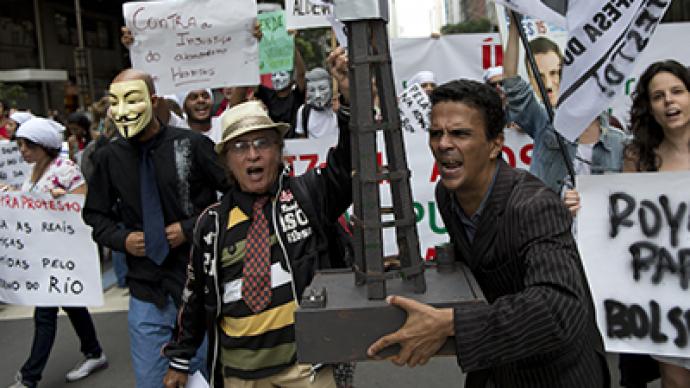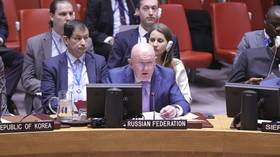Olympics under threat: 200,000 protest oil wealth distribution bill in Rio

Hundreds of thousands of Rio de Janeiro’s citizens marched the streets in protest a law to leech the state’s oil wealth, redistributing it around Brazil. Rio slammed the bill, saying it will ‘cripple’ the state and endanger the 2016 Olympics.
Demonstrators gathered in the center of Rio for the protest, named "Veto Dilma! Against injustice. In defense of Rio.” Many of the participants were ferried in from surrounding towns for the mass rally.
The bill would lower the royalties collected by producing states from 26 per cent to 20 per cent, redistributing the difference around Brazil’s other states.
To encourage public support for the protest movement, transport was free around the city throughout Monday afternoon.
Rio’s state Governor Sergio Cabral attacked the new law, branding it “unconstitutional.”“I am expecting President Dilma to veto this,” said Cabral. “It represents a loss 4 billion reais (US$1.9 billion) for the state in 2013. Without this money the state will be crippled, there will be no Olympics or World Cup.”While Julio Bueno, Rio’s state secretary for economic development said "the consequences would be disastrous" for the state, given that some towns and cities get around 60 per cent of their revenues from oil royalties.
The new legislation will cost Rio an estimated $1.6 billion a year from 2013 onwards as the state’s massive oil wealth will be evenly distributed across Brazil’s other 25 states.
The disputed bill was given the go-ahead by the Brazilian congress on November 7, but protesters and Rio’s authorities alike are appealing to President Dilma Rouseff to axe the legislation before it is made law.
President Dilma has until Friday to exercise his veto, if he does not Rio’s authorities have resolved to take the case to the country’s Supreme Court.
Brazil’s non-producing states have been pushing for the equal distribution of resource wealth across the country, which the oil-producers bitterly oppose. Under the new legislation these states would see their oil revenues rise from 7 per cent to 21 per cent by 2013, and a further 6 per cent by 2020.
Massive oil reserves were found off the coast of Rio in 2007 and are estimated to hold more than 100 billion barrels of high-quality crude oil with the potential to turn Brazil into one of the world leaders in oil exports.












